British education system

Some of the data collected by this provider is for the purposes of personalization and measuring advertising effectiveness.
Some of the data collected by this provider is for the purposes of personalization and measuring advertising effectiveness.

The British Education System can be very different and potentially confusing for new overseas parents looking to enrol their child at school in the UK. The Bright World team hopes this guide can provide a clear step-by-step introduction to each stage of British education.
The education system in the UK is divided into four main parts; primary education, secondary education, further education and higher education.
The education system in the UK is also split into "key stages" which breaks down as follows:
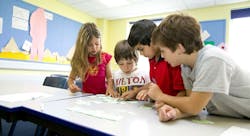
Primary school education begins in the UK at age 5 and continues until age 11, comprising key stages one and two under the UK educational system.
Some primary schools are split up into Infant and Junior levels. These are usually separate schools on the same site. The infant age range (Key Stage 1) is from age 5 to 7. The Junior age range (Key Stage 2) is from age 7 to 11.
The year groups at primary School level are:
Year R (Reception) (age 4 – 5)
Year 1 (age 5 - 6)
Year 2 (age 6 - 7) The year when SATs testing takes place for Key Stage 1
Year 3 (age 7 - 8)
Year 4 (age 8 - 9)
Year 5 (age 9 - 10)
Year 6 (age 10 - 11) The year when SATs testing takes place for Key Stage 2
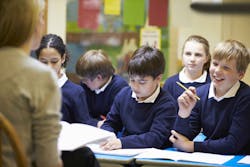
Years 7 and 8 are the first two years of secondary school education in the UK. In some independent schools they are included in the Junior School, in others, they are part of the Senior School.
Under the UK school system, all students study English, Maths, Sciences, a Humanities subject and a Modern Language. Besides these, each school has a list with optional subjects such as Art, Music, Drama, Latin, Sport Science, Design Technology, Computer Science, etc. and students may choose a few subjects that interest them.
In some schools, students sit the Common Entrance Exam in year 7. There are 3 examination sessions, in November, January and May/June. The transition from Junior to Senior School (from year 8 to year 9) may be conditioned upon the Common Entrance Exam results in those schools.

Year 9 is a very important year in the British school system, as many students make the transition from Junior School to Senior School. It is also a very good foundation for the GCSE programme and it is an entry point to all schools.
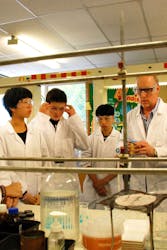
In the last two years of secondary education, which are called Year 10 and Year 11, starting at age 14, students prepare for GCSE exams that are taken after two years (General Certificate of Secondary Education).
In the UK school system, during the GCSE programme, students study between 9 and 12 subjects. Some of them are compulsory (English, Maths, Sciences, Humanities, a Modern Language etc.), some are chosen by each student according to their abilities and preferences. At the end of the 2 year GCSE programme, following the examinations on each studied subject, students receive their GCSE Certificates.
The chosen subjects and the GCSE results are very important for their Further Studies (A-Level or IB) and for their University admission.
Some schools offer a 1 Year GCSE programme in Year 11 for international students seeking a school education in the UK. These intensive, one year courses, are available for students aged 15 plus, with the appropriate academic level from their own country. Fewer subjects are studied (maximum 6).
The IGCSE programme (International General Certificate of Secondary Education) prepare international students for A-Level and/or IB.
Students study between 5 and 7 subjects, English, Maths and Science being included. Each school has a list of available subjects for IGCSE students. At the end of Year 11, students take exams in each studied subject and receive IGCSE Certificates.

In the UK school system, once a student reaches the age of 16, they can start a 2 year programme which leads to A (Advanced) level examinations. Students specialise in 3 or 4 subjects, that are usually relevant to the degree subject they wish to follow at university. A levels are state examinations and are recognised by all UK universities and by institutions worldwide.
At the end of Year 13, following the examinations in each subject, the students receive A level Certificates.
Those who would like to study more than 3-4 subjects, may continue their studies in a broader number of subjects with the International Baccaularete Diploma Programme, offered by some independent schools.
During the IB, students study 6 subjects, 3 at higher level (HL) and 3 at standard level (SL). Each school offers different subjects at different study levels (HL/SL). The IB programme also includes a compulsory Core programme consisting of Theory of Knowledge (TOK), Extended Essay (EE) and Creativity, Activity, Service (CAS).
Students take written examinations on each subject at the end of their courses.

International students can either choose a state sixth form college or a college of further education as an alternative to private education. Both offer GCSE and A level courses for students from the age of 16. Colleges of further education also offer foundation and diploma courses. All colleges can prepare students for entry to a UK university or any university in the world. Bright World works with a number of state colleges in the UK which provide a multitude of vocational and academic courses. These courses can enable students to pursue their chosen career or to gain a place at a university of their choice.
The British school system also extends to BTEC courses which are designed for students who would like to develop practical knowledge and skills in a specific subject (Business, Psychology, Engineering, Sport, Art & Design) and find traditional exams challenging. Focussing on practical, skills-based learning, the BTEC students are assessed during the course. After each unit students are assessed through assignments, tasks or tests, and not at the end of the programme as it happens with GCSE or A-Level students.

From age 17, international students can opt to study one year foundation programmes, instead of A levels or IB. These courses lead to private examinations that are an alternative to A levels. Foundation courses at colleges are recognised by universities with whom they have partnerships.
Some universities also offer foundation courses that lead onto their own degree programmes.
Bright World has partnerships with a number of colleges and Pathway providers and can help place students into Foundation and Diploma courses in London and across the UK.
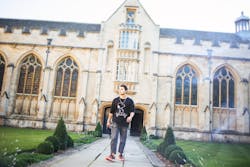
In the UK, a British bachelors degree normally takes three years to complete and most are awarded at honours level. Examples of first degrees are: BA (Bachelor of Arts), BEng (Bachelor of Engineering), and BSc (Bachelor of Science).
State colleges offer some 2 year vocational diplomas that grant exemption from the first and sometimes second year of a degree programme. Some private tutorial colleges offer a one year diploma programme which is equivalent to year 1 of university. Students taking 1 year diplomas are awarded second year entry at some universities.

Postgraduate courses in the UK education system are very intensive. This means that the courses are usually much shorter than in other countries. A master's degree typically takes 12 months to complete, for example an MA - Master of Arts and an MEng - Master of Engineering. An MBA (Master of Business Administration) is a high profile Masters course which can take 2 years. Applicants will usually be high achieving with at least 2 years managerial experience. A PhD research degree in the UK can take between 2 and 7 years.
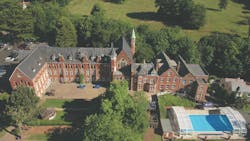
Bright World works almost exclusively with privately funded schools and colleges. A boarding school is a residential school where pupils live and study during the school year. There are approximately 500 boarding schools across England, Wales, Scotland and Northern Ireland.
UK boarding schools offer pupils an outstanding education, helping them to develop their skills and progress to university. All UK boarding schools have to meet strict government standards on the quality of their teaching, facilities and student care.
Many UK boarding schools combine beautiful, centuries-old buildings with a mix of modern classrooms and traditional architecture. The excellent facilities help make living and learning a great experience and pupils will will improve their English skills while they study.

Tutorial Colleges start at age 15 and have a more flexible programme range, focussing on fast access to UK university.
Many of the independent private sixth form colleges in Oxford, Cambridge and London work on a 'tutorial system' and are often referred to as 'tutorial colleges'. The tutorial system originates from Oxford and Cambridge Universities and is a very highly regarded and much tested system. It it is still used today and is the cornerstone of an 'Oxbridge' education. A tutorial is a small class of only a few students, in which the tutor (a lecturer or other academic faculty member) gives individual attention to the students.

A state boarding school is one where you pay for boarding and the education is free. The government pays for the education as it would at any other state school in England.
Admission to state boarding schools in the UK is limited to children who are nationals of the UK and are eligible to hold a full UK passport, or those who are nationals of other European Union countries or those who have the right of residence in the UK. Please note that the holding of a BN(O) passport does not make the child eligible for a state boarding school in the UK.

An FE college is an institution that provides education for those above school age (age 16). There are many types of FE colleges including, sixth form colleges, specialist colleges and adult education institutes. FE Colleges are state run and as such those members of the EU joining can benefit from free education. There is also a competitive fee structure available for non-EU international students.

If you need to improve your English language or study skills before attending a UK university, pathway providers offer unique foundation courses which often lead to direct degree-level entry upon completion. There are several private companies who operate Foundation and Diploma programmes on the campuses of UK universities. Often these courses offer accelerated access to undergraduate degrees.

The UK is one of the world's most popular destination for students from overseas. In fact, more than 400,000 international students enrol each year. International students considering an education in the UK have a choice of over 140 universities and higher education institutions, each offering a great range of tertiary qualifications that will be recognised the world over. Students join a 3 year undergraduate programme or a 1 year postgraduate course.

For expert advice on UK and US university entry, Bright World has teamed up with Education Advisers Ltd, whose experienced consultants offer a full range of Higher Education services for international students. These range from complimentary advice on the best University Foundation courses, to bespoke Oxbridge and Medical School coaching and mentorship programmes.
You can visit their websites at www.educationadvisers.co.uk or call +44 1622 813870 for further information.